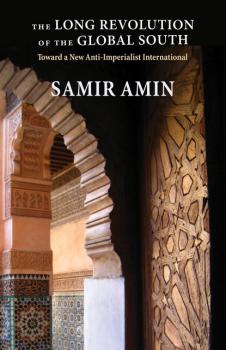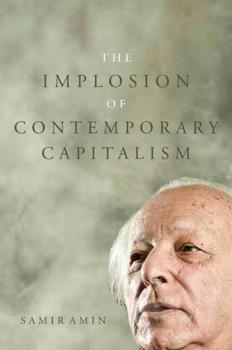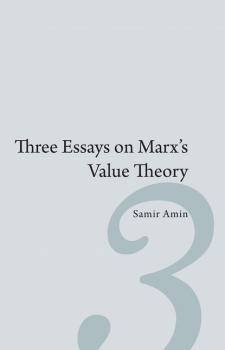ТОП просматриваемых книг сайта:
Samir Amin
Список книг автора Samir AminАннотация
The final writings of Samir Amin—a mix of personal experiences and theoretical analysis of global challenges and movements In this second volume of his memoirs, Amin takes us on a journey to a dizzying array of countries, recounting the stages of his ongoing dialogue over several decades with popular movements struggling for a better future. As in his many works over the years, The Long Revolution of the Global South combines Amin’s astute theoretical analyses of the challenges confronting the world’s oppressed peoples with militant action. In these final writings based on his life, Amin presents us with theoretical interventions, analyses of political conjunctures, and narration of personal experiences. Amin’s reminiscences of travels to places too often overlooked by the world at large are a joy to read. We even catch a glimpse of some of his memorable—and sometimes not so memorable—culinary adventures.
Аннотация
A collection of Samir Amin’s ten most influential essays of the 21st century Radical political economist Samir Amin left behind a cherished oeuvre of Marxist writings. Amin’s intellectual range—from economics to culture—was admirable, and his lessons remain essential. Monthly Review Press is honored to publish this volume, culled from the Monthly Review magazine, of ten of Samir Amin’s most significant essays written in the twenty-first century. The collection is introduced by Amin’s friend and comrade, the Marxist philosopher Aijaz Ahmad, who provides a comprehensive survey of Amin’s life and path-breaking work. Ahmad also offers a contextual focus by which to read such stunningly astute pieces as “Revolution or Decadence?” and “Contemporary Imperialism.” Only People Make Their Own History is a loving and enlightening look at what the work of Samir Amin has meant—and will mean— to millions of people the world over.
Аннотация
According to renowned Marxist economist Samir Amin, the recent Arab Spring uprisings comprise an integral part of a massive «second awakening» of the Global South. From the self-immolation in December 2010 of a Tunisian street vendor, to the consequent outcries in Cairo's Tahrir Square against poverty and corruption, to the ongoing upheavals across the Middle East and Northern Africa, the Arab world is shaping what may become of Western imperialism – an already tottering and overextended system. The Reawakening of the Arab World examines the complex interplay of nations regarding the Arab Spring and its continuing, turbulent seasons. Beginning with Amin’s compelling interpretation of the 2011 popular Arab explosions, the book is comprised of five chapters – including a new chapter analyzing U.S. geo-strategy. Amin sees the United States, in an increasingly multi-polar world, as a victim of overreach, caught in its own web of attempts to contain the challenge of China, while confronting the staying power of nations such as Syria and Iran. The growing, deeply-felt need of the Arab people for independent, popular democracy is the cause of their awakening, says Amin. It this awakening to democracy that the United States fears most, since real self-government by independent nations would necessarily mean the end of U.S. empire, and the economic liberalism that has kept it in place. The way forward for the Arab world, Amin argues, is to take on, not just Western imperialism, but also capitalism itself.
Аннотация
Renowned political economist Samir Amin, engaged in a unique lifelong effort both to narrate and affect the human condition on a global scale, brings his analysis up to the present—the world of 2013. The key events of our times—financial crisis, the emerging nations, globalization, financialization, political Islam, Euro–zone implosion—are related in a coherent, historically based, account. Changes in contemporary capitalism require an updating of definitions and analysis of social classes, class struggles, political parties, social movements and the ideological forms in which they express their modes of action in the transformation of societies. Amin meets this challenge and lays bare the reality of monopoly capitalism in its general, global form. Ultimately, Amin demonstrates that this system is not viable and that the implosion in progress is unavoidable. Whether humanity will rise to the challenge of building a more humane global order free of the contradictions of capital, however, is yet to be seen.
Аннотация
Out of early twentieth-century Russia came the world’s first significant effort to build a modern revolutionary society. According to Marxist economist Samir Amin, the great upheaval that once produced the Soviet Union has also produced a movement away from capitalism – a long transition that continues even today. In seven concise, provocative chapters, Amin deftly examines the trajectory of Russian capitalism, the Bolshevik Revolution, the collapse of the Soviet Union, the possible future of Russia – and, by extension, the future of socialism itself. Amin manages to combine an analysis of class struggle with geopolitics – each crucial to understanding Russia’s singular and complex political history. He first looks at the development (or lack thereof) of Russian capitalism. He sees Russia’s geopolitical isolation as the reason its capitalist empire developed so differently from Western Europe, and the reason for Russia’s perceived “backwardness.” Yet Russia’s unique capitalism proved to be the rich soil in which the Bolsheviks were able to take power, and Amin covers the rise and fall of the revolutionary Soviet system. Finally, in a powerful chapter on Ukraine and the rise of global fascism, Amin lays out the conditions necessary for Russia to recreate itself, and perhaps again move down the long road to socialism. Samir Amin’s great achievement in this book is not only to explain Russia’s historical tragedies and triumphs, but also to temper our hopes for a quick end to an increasingly insufferable capitalism. This book offers a cornucopia of food for thought, as well as an enlightening means to transcend reductionist arguments about “revolution” so common on the left. Samir Amin’s book – and the actions that could spring from it – are more necessary than ever, if the world is to avoid the barbarism toward which capitalism is hurling humanity.
Аннотация
Samir Amin's ambitious new book argues that the ongoing American project to dominate the world through military force has its roots in European liberalism, but has developed certain features of liberal ideology in a new and uniquely dangerous way. Where European political culture since the French Revolution has given a central place to values of equality, the American state has developed to serve the interests of capital alone, and is now exporting this model throughout the world. American imperialism, Amin argues, will be far more barbaric than earlier forms of imperialism, pillaging natural resources and destroying the lives of the poor. The Liberal Virus examines the ways in which the American model is being imposed on the world, and outlines its economic and political consequences. It shows how both citizenship and class consciousness are diluted in «low-intensity democracy» and argues instead for democratization as an ongoing process—of fundamental importance for human progress—rather than a fixed constitutional formula designed to support the logic of capital accumulation.In a panoramic overview, Amin examines the objectives and outcomes of American policy in the different regions of the world. He concludes by outlining the challenges faced by those resisting the American project today: redefining European liberalism on the basis of a new compromise between capital and labor, re-establishing solidarity among the people of the South, and reconstructing an internationalism that serves the interests of regions that are currently divided against each other.
Аннотация
In this slim, insightful volume, noted economist Samir Amin returns to the core of Marxian economic thought: Marx’s theory of value. He begins with the same question that Marx, along with the classical economists, once pondered: how can every commodity, including labor power, sell at its value on the market and still produce a profit for owners of capital? While bourgeois economists attempted to answer this question according to the categories of capitalist society itself, Marx sought to peer through the surface phenomena of market transactions and develop his theory by examining the actual social relations they obscured. The debate over Marx’s conclusions continues to this day. Amin defends Marx’s theory of value against its critics and also tackles some of its trickier aspects. He examines the relationship between Marx’s abstract concepts—such as “socially necessary labor time”—and how they are manifested in the capitalist marketplace as prices, wages, rents, and so on. He also explains how variations in price are affected by the development of “monopoly- capitalism,” the abandonment of the gold standard, and the deepening of capitalism as a global system. Amin extends Marx’s theory and applies it to capitalism’s current trajectory in a way that is unencumbered by the weight of orthodoxy and unafraid of its own radical conclusions.
Аннотация
Since its first publication twenty years ago, Eurocentrism has become a classic of radical thought. Written by one of the world’s foremost political economists, this original and provocative essay takes on one of the great «ideological deformations» of our time: Eurocentrism. Rejecting the dominant Eurocentric view of world history, which narrowly and incorrectly posits a progression from the Greek and Roman classical world to Christian feudalism and the European capitalist system, Amin presents a sweeping reinterpretation that emphasizes the crucial historical role played by the Arab Islamic world. Throughout the work, Amin addressesa broad set of concerns, ranging from the ideological nature of scholastic metaphysics to the meanings and shortcomingsof contemporary Islamic fundamentalism. This second edition contains a new introduction and concluding chapter, both of which make the author’s arguments even more compelling.
Аннотация
BRICS is a grouping of the five major emerging economies of Brazil, Russia, India, China and South Africa. Volume five in the Democratic Marxism series, BRICS and the New American Imperialism challenges the mainstream understanding of BRICS and US dominance to situate the new global rivalries engulfing capitalism. It offers novel analyses of BRICS in the context of increasing US induced imperial chaos, deepening environmental crisis tendencies (such as climate change and water scarcity), contradictory dynamics inside BRICS countries and growing subaltern resistance.The authors revisit contemporary thinking on imperialism and anti-imperialism, drawing on the work of Rosa Luxemburg, one of the leading theorists after Marx, who attempted to understand the expansionary nature of capitalism from the heartlands to the peripheries. The richness of Luxemburg’s pioneering work inspires most of the volume’s contributors in their analyses of the dangerous contradictions of the contemporary world as well as forms of democratic agency advancing resistance.While various forms of resistance are highlighted, among them water protests, mass worker strikes, anti-corporate campaigning and forms of cultural critique, this volume grapples with the challenge of renewing anti-imperialism beyond the NGO-driven World Social Forum and considers the prospects of a new horizontal political vessel to build global convergence.It also explores the prospects of a Fifth International of Peoples and Workers.
Аннотация
Unlike such obvious forms of oppression as feudalism or slavery, capitalism has been able to survive through its genius for disguising corporate profit imperatives as opportunities for individual human equality and advancement. But it was the genius of Karl Marx, in his masterwork, Capital, to discover the converse law of surplus value: behind the illusion of the democratic, supply-and-demand marketplace, lies the workplace, where people trying to earn a living are required to work way beyond the time it takes to pay their wages. Leave it to the genius of Samir Amin to advance Marx's theories—adding to them the work of radical economists such as Michal Kalecki, Josef Steindl, Paul Baran, and Paul Sweezy—to show how Marxian theory can be adapted to modern economic conditions. Amin extends Marx's analysis to describe a concept of “imperialist rent” derived from the radically unequal wages paid for the same labor done by people in both the Global North and the Global South, the rich nations and the poor ones. This is global oligopolistic capitalism, in which finance capital has come to dominate worldwide production and distribution. Amin also advances Baran and Sweezy’s notion of economic surplus to explain a globally monopolized system in which Marx's “law of value” takes the form of a “law of globalized value,” generating a super-exploitation of workers in the Global South. Modern Imperialism, Monopoly Finance Capital, and Marx's Law of Value offers readers, in one volume, the complete collection of Samir Amin’s work on Marxian value theory. The book includes texts from two of Amin's recent works, Three Essays on Marx’s Value Theory and The Law of Worldwide Value, which have provoked considerable controversy and correspondence. Here, Amin answers his critics with a series of letters, clarifying and developing his ideas. This work will occupy an important place among the theoretical resources for anyone involved in the study of contemporary Marxian economic and political theory.Unlike such obvious forms of oppression as feudalism or slavery, capitalism has been able to survive through its genius for disguising corporate profit imperatives as opportunities for individual human equality and advancement. But it was the genius of Karl Marx, in his masterwork, Capital, to discover the converse law of surplus value: behind the illusion of the democratic, supply-and-demand marketplace, lies the workplace, where people trying to earn a living are required to work way beyond the time it takes to pay their wages. Leave it to the genius of Samir Amin to advance Marx's theories—adding to them the work of radical economists such as Michal Kalecki, Josef Steindl, Paul Baran, and Paul Sweezy—to show how Marxian theory can be adapted to modern economic conditions. Amin extends Marx's analysis to describe a concept of “imperialist rent” derived from the radically unequal wages paid for the same labor done by people in both the Global North and the Global South, the rich nations and the poor ones. This is global oligopolistic capitalism, in which finance capital has come to dominate worldwide production and distribution. Amin also advances Baran and Sweezy’s notion of economic surplus to explain a globally monopolized system in which Marx's “law of value” takes the form of a “law of globalized value,” generating a super-exploitation of workers in the Global South. Modern Imperialism, Monopoly Finance Capital, and Marx's Law of Value offers readers, in one volume, the complete collection of Samir Amin’s work on Marxian value theory. The book includes texts from two of Amin's recent works, Three Essays on Marx’s Value Theory and The Law of Worldwide Value, which have provoked considerable controversy and correspondence. Here, Amin answers his critics with a series of letters, clarifying and developing his ideas. This work will occupy an important place among the theoretical resources for anyone involved in the study of contemporary Marxian economic and political theory.










